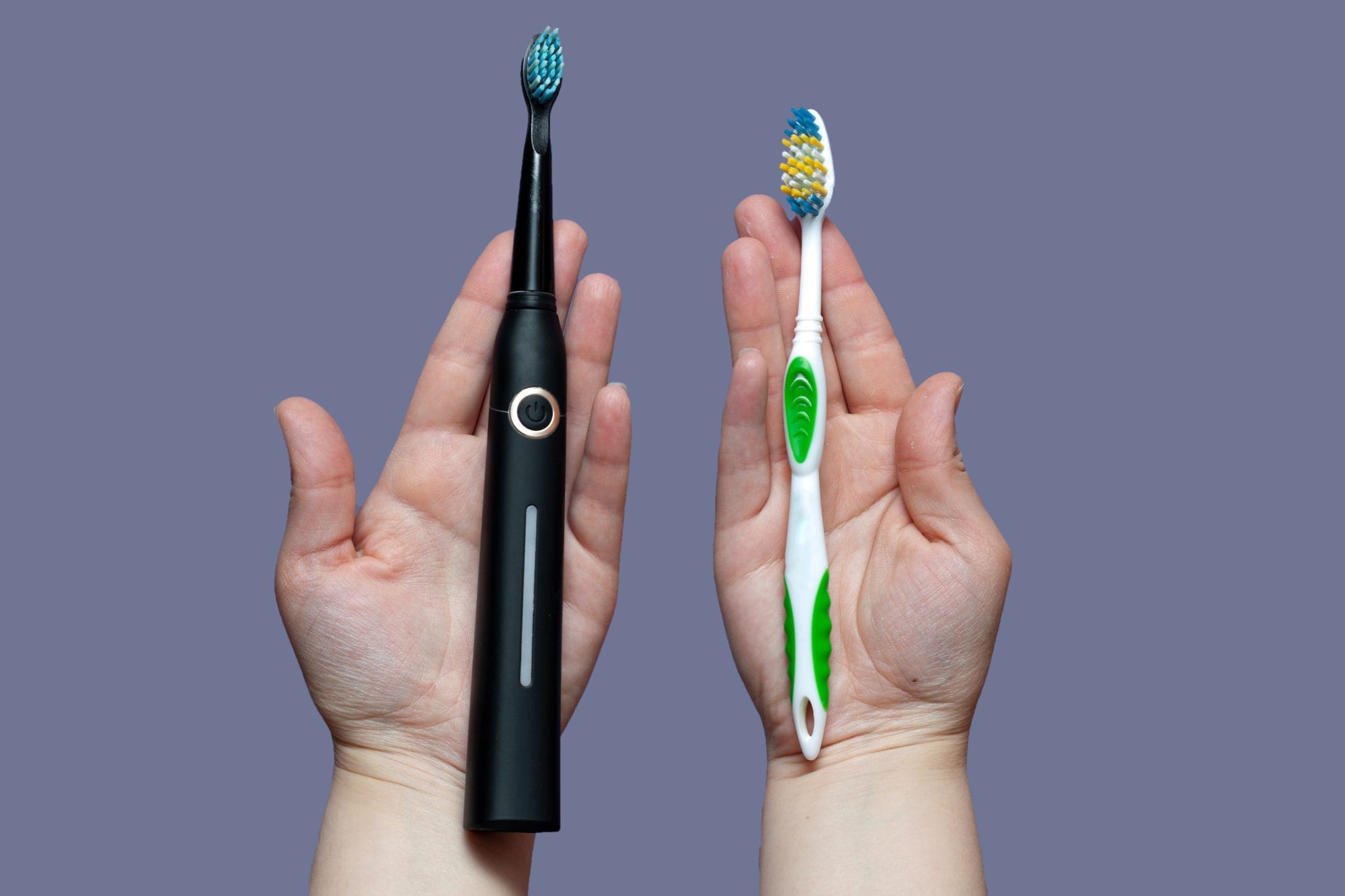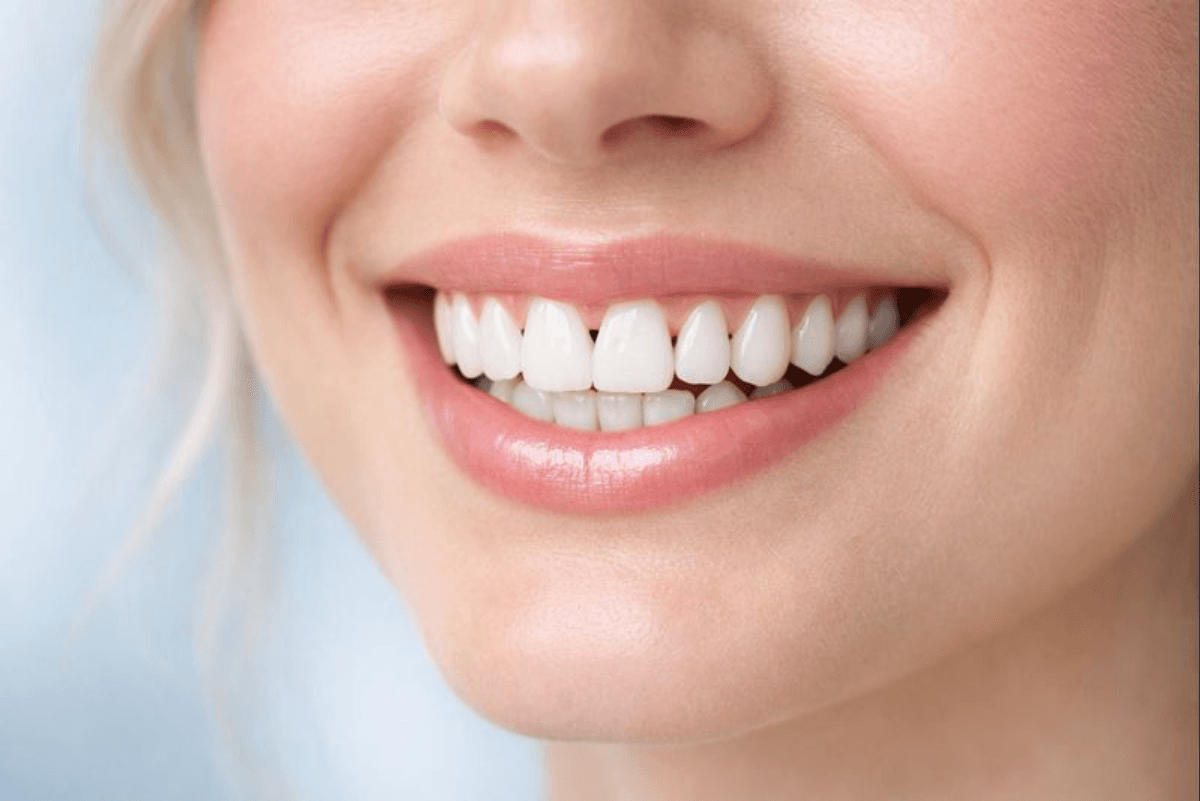For years, the debate over which toothbrush provides a more effective clean has been a central topic in dental conversations. Surprisingly, one of the most common questions patients bring to us at Eau Claire Park Dental is, “Should I use an electric toothbrush or a manual one?”
While both options can play a role in maintaining oral health, modern research and clinical experience demonstrate that electric toothbrushes offer distinct advantages for supporting long-term dental wellness and reducing the risk of gum disease.
This guide explores the scientific and practical reasons to help you make an informed decision for your oral health.

TL;DR: Does an Electric Toothbrush Really Make a Difference for Your Oral Health?
- Both manual and electric toothbrushes can support oral health, but research consistently favours electric options.
- Electric toothbrushes are the best toothbrushes for gum disease prevention, removing significantly more plaque than manual alternatives.
- Key electric toothbrush benefits include superior plaque removal, built-in timers, pressure sensors, and accessibility features.
- Manual vs. electric toothbrush effectiveness studies show electric users retain 19.5% more teeth over 11 years.
- Electric toothbrushes help with gum disease by providing more consistent, thorough cleaning.
- Electric toothbrushes provide special benefits for patients with braces, arthritis, or dexterity challenges.
- At Eau Claire Park Dental, electric toothbrushes are part of our prevention-first approach to long-term dental care.
The Critical Connection Between Your Toothbrush and Gum Health
The primary objective of brushing is to meticulously remove plaque and bacteria that accumulate throughout the day. When left undisturbed, this sticky biofilm (plaque) hardens into calculus (tartar), leading to gingivitis—the initial, and fortunately reversible, stage of gum disease.
If this inflammatory process persists unchecked, it escalates to periodontitis, ultimately compromising the bone structure supporting your teeth and potentially leading to tooth loss.
The scope of this problem is significant. According to the Canadian Dental Association, seven out of ten Canadians will develop gum disease at some point in their lives. However, this condition is largely preventable with proper oral hygiene and regular professional care.
Effective prevention hinges on consistent, thorough brushing for two minutes, twice a day, complemented by daily flossing—both traditional string floss and water flossing with devices like Waterpik. The challenge lies in achieving flawless technique with your toothbrush to access all tooth surfaces and the critical area beneath the gum line.
Electric vs. Manual: What the Evidence Reveals
For decades, dental education emphasized that proper brushing technique outweighed the type of brush. While manual brushes can be effective in the hands of a meticulous brusher, evidence now confirms that electric toothbrushes frequently deliver superior results in real-world settings.
The Landmark 11-Year Study
A groundbreaking study published in the Journal of Clinical Periodontology followed participants for over a decade and revealed striking differences in manual vs. electric toothbrush effectiveness:
✓ Electric toothbrush users experienced less progression of gum disease.
✓ Participants retained an average of 19.5% more teeth compared to manual brush users.
✓ Significantly reduced plaque accumulation was observed in the electric toothbrush group.
✓ Lower rates of tooth loss due to periodontal complications.
Why Electric Toothbrushes Are More Effective
The superior performance of electric toothbrushes stems from several key technological advantages:
1. Exceptional Plaque Removal
Electric toothbrushes, particularly those with oscillating-rotating technology, are clinically proven to remove substantially more plaque than manual brushes. Their high-speed rotations (up to 8,800 movements per minute) and micro-vibrations perform the meticulous work of cleaning teeth and gums with superior efficiency.
2. Integrated Timers
A common challenge is dedicating the recommended two minutes to brushing. Many electric brushes incorporate built-in timers that pulse or vibrate, ensuring you reach this crucial benchmark. Advanced models feature a quad pacer, which signals every 30 seconds to prompt you to move to a new quadrant of your mouth. Premium models like the Oral-B iO series even connect to smartphone apps that provide real-time brushing guidance, track your brushing habits, and offer personalized coaching to improve your technique.
3. Pressure Sensors
Excessive force while brushing can abrade gums and erode tooth enamel. Many advanced electric toothbrushes are equipped with pressure sensors that alert you with a light or vibration change, helping prevent damage and recession.
4. Consistent Technique
Unlike manual brushing, which relies entirely on user technique, electric toothbrushes provide consistent cleaning motion, reducing the variability in daily oral care effectiveness.
Additional Electric Toothbrush Benefits
Beyond superior plaque removal, electric toothbrushes offer several other notable benefits:
- Reduced Environmental Impact: By replacing only the small brush head every three months, electric toothbrushes generate significantly less plastic waste than discarding entire manual toothbrushes.
- Accessibility for Dexterity Challenges: For individuals with conditions like arthritis, carpal tunnel, or other mobility issues, the larger handles and automated action of an electric toothbrush make brushing significantly easier and more effective.
- Optimized for Orthodontic Care: The compact, rotating head of certain electric toothbrushes navigates more easily around brackets and wires, ensuring thorough cleaning for patients with braces.
- Motivation and Habit Formation: Many users find the technology engaging, making them more likely to brush for the full two minutes and maintain consistent oral hygiene habits.
These advanced features simplify the process of maintaining healthy brushing habits and achieving a more thorough clean, which is fundamental to preventing and managing gum disease.
Best Electric Toothbrushes for Gum Disease Prevention
When selecting the best toothbrush for gum disease, certain features and models stand out based on clinical research and patient outcomes:
Oscillating-Rotating Brushes
- Small, round heads that rotate at high speeds
- Excel at plaque removal and gum stimulation
- Best for: Comprehensive plaque control and gum health
- Leading example: Oral-B Pro series
Sonic/Vibrational Brushes
- Traditional-shaped heads that vibrate at high frequencies
- Effective for plaque disruption and gentle cleaning
- Best for: Sensitive gums and general maintenance
- Leading example: Philips Sonicare series
For maximum enamel and gum protection, select soft bristles and replace brush heads every three months, just like a normal toothbrush. For added assurance, look for models that carry the Canadian Dental Association Seal of Approval, verifying their clinical effectiveness.
Who Benefits Most from Electric Toothbrushes?
While electric toothbrushes offer advantages for most users, certain patients see particularly dramatic improvements:
→ Patients with active gum disease. The superior plaque removal helps control bacterial load and reduce inflammation.
→ Individuals with braces or dental work. Enhanced cleaning around orthodontic appliances, implants, and crowns.
→ Those with dexterity limitations. Arthritis, stroke recovery, or other conditions affecting hand mobility.
→ Inconsistent brushers. Built-in timers and engaging technology improve compliance.
→ Patients with receding gums. Pressure sensors help prevent further recession while maintaining effective cleaning.
FAQ: Electric vs. Manual Toothbrushes
Are electric toothbrushes really worth the investment?
Yes, for most patients. The clinical evidence consistently shows superior plaque removal, reduced gum disease progression, and better long-term tooth retention. When you consider the cost of treating gum disease or replacing lost teeth, the investment in an electric toothbrush pays for itself many times over.
How often should I replace electric toothbrush heads?
Every 3 months, just like manual toothbrushes. Many electric toothbrush heads have indicator bristles that fade when replacement is needed. Some smart toothbrushes even send reminders through connected apps.
Can electric toothbrushes damage my gums?
When used properly, electric toothbrushes are gentler on gums than manual brushing. The key is using light pressure and choosing a brush with pressure sensors. Start with the gentlest setting and let the brush do the work.
Do electric toothbrushes work better for people with braces?
Absolutely. The oscillating motion and smaller brush heads of many electric toothbrushes make it easier to clean around brackets and wires. Specialized orthodontic brush heads are available for even more effective cleaning.
What's the difference between sonic and oscillating electric toothbrushes?
Oscillating toothbrushes have small, round heads that rotate and are clinically proven superior for plaque removal. Sonic toothbrushes have traditional-shaped heads that vibrate at high frequencies and may be more comfortable for sensitive teeth.
How long do electric toothbrushes last?
Quality electric toothbrushes typically last 3-5 years with proper care. The brush heads need replacement every 3 months, but the motor base should provide years of reliable service.
Can children use electric toothbrushes?
Yes, many manufacturers make electric toothbrushes specifically designed for children, typically starting around age 3. These often feature gentler vibrations, smaller brush heads, and fun designs to encourage good brushing habits.
Will my dental insurance cover an electric toothbrush?
Most Canadian dental insurance plans don't cover toothbrushes, but some employer Health Spending Accounts (HSAs) may reimburse electric toothbrushes as medical devices. Check with your benefits provider for specific coverage details.
The Verdict: Electric Brushes Lead the Way
While manual toothbrushes can be effective in the hands of a dedicated and skilled brusher, electric toothbrushes consistently provide a measurable advantage in supporting gum health and preventing long-term complications.
The evidence is clear: electric toothbrushes help with gum disease by providing more consistent, thorough plaque removal than manual alternatives. For patients asking, "Does an electric toothbrush help with gum disease?" the answer is a resounding yes.
At Eau Claire Park Dental, our prevention-focused philosophy leads us to recommend electric toothbrushes as the most effective choice for most patients. They simplify good oral hygiene habits, protect delicate gum tissue, and ultimately help preserve your natural teeth for life.
Ready to Elevate Your Oral Hygiene Routine?
Transitioning to an electric toothbrush is a simple yet impactful step toward better oral health.
The best toothbrush for gum disease is ultimately the one that removes the most plaque consistently—and the evidence clearly favours electric options.
Should you have any questions about selecting the right brush for your specific needs or require guidance on preventing gum disease, our dedicated team at Eau Claire Park Dental is here to assist you.
Contact us today to schedule your next appointment and receive personalized advice from Calgary's prevention-focused dental team in downtown Calgary.



